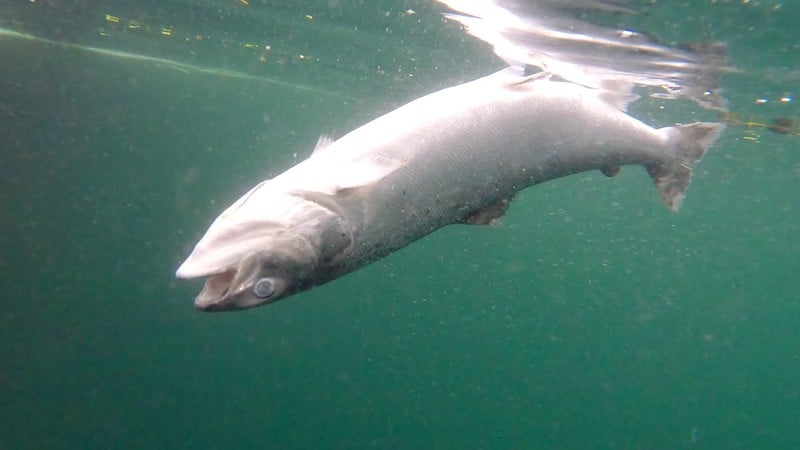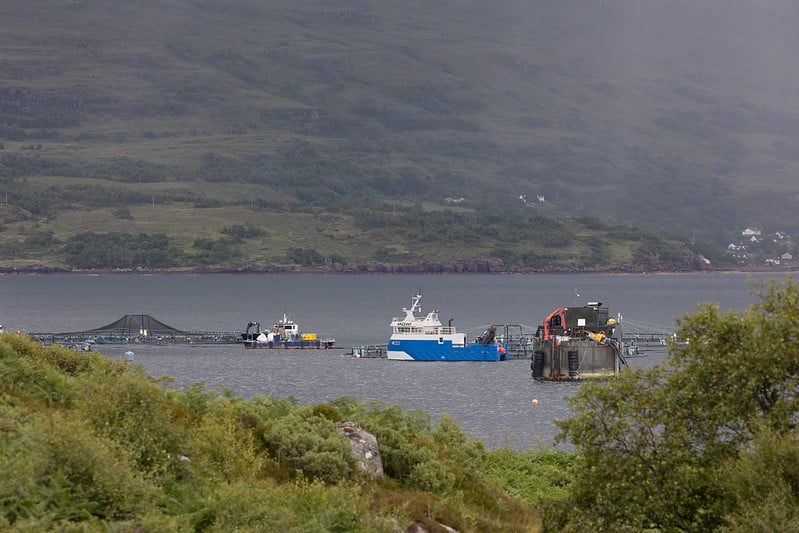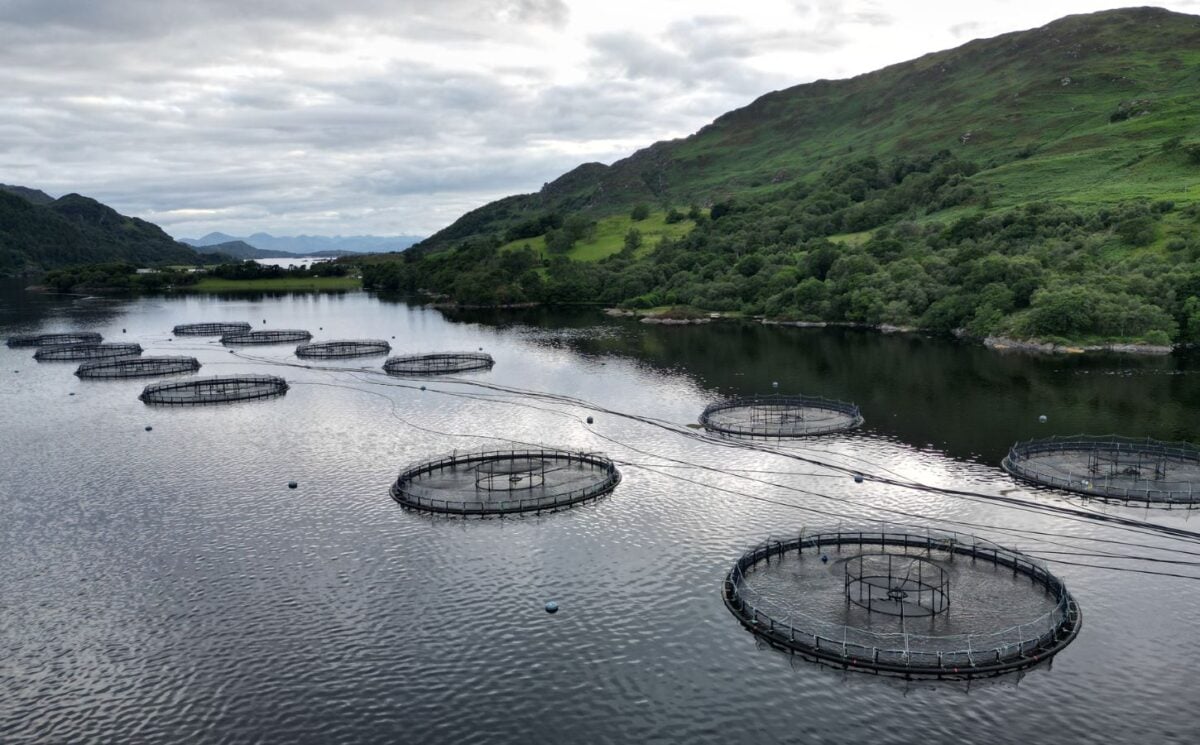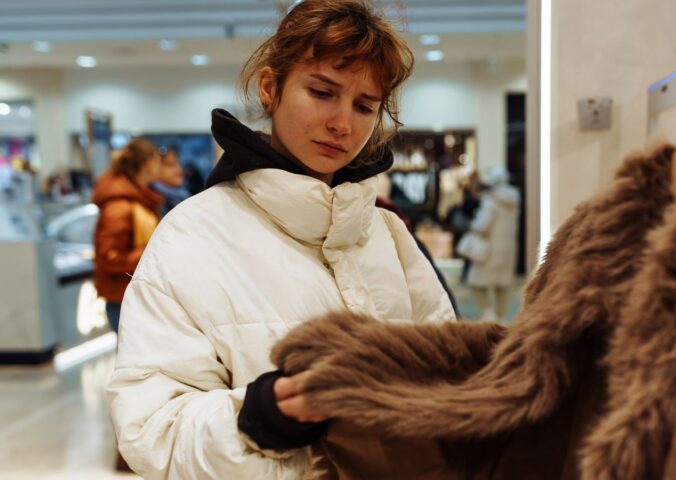*Warning: this article contains images that some might find distressing*
Salmon at farms supplying major UK supermarkets were “plagued” with sea lice and jellyfish blooms during an unprecedented marine heatwave this summer, according to a new investigation.
Vegan charity Viva! Captured footage from five farms operated by Bakkafrost, Scottish Sea Farms, and Mowi, all located in lochs off the west coast of Scotland. The farms supply Asda, Co-op, Sainsbury’s, M&S, and Tesco. All were battling high levels of sea lice, gill inflammation, and bacterial disease.
Blooms of jellyfish also surrounded several of the farms, potentially contributing to more fish deaths. Increasing numbers of jellyfish in such areas may be down to warming oceans. This summer has seen exceedingly high water temperatures around the west coast of the UK – another source of stress for the caged salmon.
Sea lice “invasions”
The footage, taken between between June 3 and July 5 this year, shows the parasitic sea lice eating salmon alive. Sea lice are a common problem on fish farms. Several previous investigations by campaigners have revealed that serious infestations are not infrequent.

Viva! described the infestations they saw at the farms as “monstrous invasions.” A report by conservation charity Wildfish revealed the extent of sea lice problems in farmed salmon. It found that in 2022, two-thirds of Scottish sea farms had breached sea lice thresholds set by the industry itself at least once. This illustrates “that sea lice remains an endemic problem in open-net aquaculture,” said Viva! in a press release.
In the wild, salmon can be affected by small numbers of lice that wash off them when they migrate through fresh water. On farms, the treatment can be almost as catastrophic for the fish and the marine environment as the lice themselves.
Hydrogen peroxide used to be the main way of dealing with sea lice. But it has been increasingly replaced by freshwater treatments including thermolicers and hydrolicers. These pump fish through tubes and sprayed them with jets of water – hot water which seems to cause them pain in the case of thermolicers.
Salmon are starved for two to three days before these treatments, and may not make it out of them alive. According to the Scottish Government, fish farms reported killing 269,674 salmon in hydrolicers between 2016 and 2019. That is an average of 67,418 a year.
Jellyfish and marine heatwaves
The number of jellyfish surrounding some of the farms was also alarming to Viva!. The salmon farming industry blamed micro-jellyfish for a rise in salmon deaths in 2022. The tiny jellyfish can kill salmon by blocking and stinging their gills, But some campaigners say that overcrowding on farms and a rise in infectious diseases is the real problem.
Whether jellyfish are killing fish or not, increasing jellyfish blooms may be caused by another environmental stressor to the fish: the climate crisis.

This summer, the waters off the west coast of the UK reached temperatures 4 to 5°C above normal. That made it one of the worst marine heatwaves in the world. The National Oceanic and Atmospheric Administration’s (NOAA) Marine Heatwave Watch has categorised the event as a Category 4 (extreme) marine heatwave.
Caged salmon can lose their appetites and experience compromised ability to regulate salt and water in their bodies. Their livers and kidneys also function inefficiently. “Any rise in temperature is an extra stress, and any sudden big rise that gets beyond what the animals are used to can cause stress to the point where they will die,” Dr Sevrine Sailley, an ecosystem modeller at Plymouth Marine Laboratory, told Euronews. “We could see mass mortality of aquaculture whether they be fish or shellfish.”
Plant-based alternatives
Fish farming was supposed to be a solution to overfishing. But it has so many welfare and environmental impacts that campaigners say it is making things worse. Salmon are carnivorous animals, and they are fed on fish caught from the ocean. This means that they are directly contributing to, rather than alleviating, the industrial fishing industry.
“Ultimately, Scottish salmon farming is a stomach-churning disaster,” Lex Rigby, Head of Investigations at Viva! Told Plant Based News. “With so many delicious cruelty-free alternatives available, it’s time the tide turned against animal farming in its entirety and embraced a plant-based future instead.”
Those alternatives include the world’s first 3D printed vegan salmon filet, which has just gone on sale in Austrian and German supermarkets. There are loads of other options widely available, too, including vegan shrimp, tuna, and calamari.






